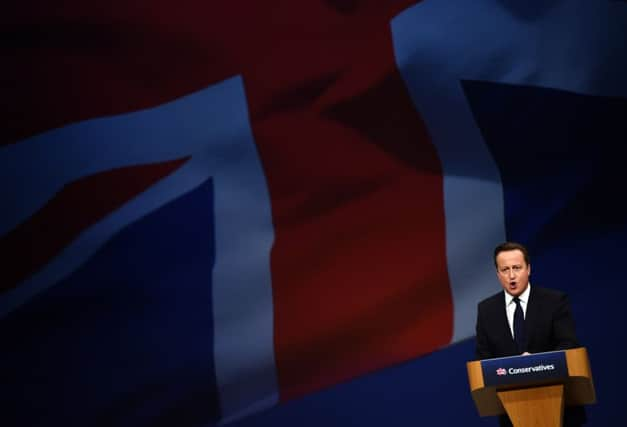Leaders: Now Cameron bids for the ‘nasty’ vote


After Theresa May’s tough line on Britain’s migrants earlier in the week, it was Prime Minister David Cameron’s turn to go in hard yesterday with a very personal assault on Jeremy Corbyn.
By describing the new Labour leader as a terrorist-sympathiser who hates Britain, Mr Cameron was far from statesman-like.
Advertisement
Hide AdAdvertisement
Hide AdIt may be the kind of rhetoric which plays well at the Tory party conference, but it will leave much of the electorate cold.
Following the Home Secretary’s lunge to the right on immigration on Tuesday, we can only assume the Tory party is unconcerned about the inevitable accusations that it has reverted to its previous status as the “nasty party”.
Mr Corbyn is likely to be forever haunted by a remark he made that the death of Osama bin Laden was a “tragedy”.
Even the Labour leader’s fiercest critics know what he meant – that bin Laden’s death before he could be tried for his crimes was part of a larger tragedy that began with the 9/11 attacks and continued with the Iraq war.
But this is politics. That comment will be taken out of context and used as a stick to beat Mr Corbyn from here until the next general election – should he make it that far.
The language used by the Prime Minister yesterday might be the sort of thing we expect in the heat of battle during an election campaign, but why now?
Labour think the Prime Minister is rattled by its new leader, but it is more likely Mr Cameron sees an opportunity to bury his rival by going for the jugular. For Labour, there is a lesson in political realities here. Mr Corbyn was always going to be a controversial choice, and subject to this kind of assault.
He may be popular with party members, but if he is to be electable he will have to put distance between himself and a past that has seen him accused of cosying up to Hamas and Hezbollah.
Advertisement
Hide AdAdvertisement
Hide AdAside from his astonishing attack on Mr Corbyn, the Prime Minister’s speech was wide-ranging.
He promised to end discrimination and to “finish the fight for real equality”.
He vowed not to “duck” a fight over EU reform ahead of the UK’s membership referendum and said he would tackle “big social problems” including extremism and “segregation” caused by faith schools. He also addressed issues as diverse as female genital mutilation and drone strikes on British Islamic State militants.
The Tories’ strategy is to position themselves as the party of the centre, protecting Britain from what they will portray as the loony left of Labour.
That took some interesting footwork from Mr Cameron the day after a speech by the Home Secretary derided by everyone from the CBI to Amnesty International.
Indeed, the tone is the most striking aspect of what we are hearing this week from the party’s conference.
The gloves are off already.
Mr Cameron has said he will not lead the Tories into the next election, so we are not witnessing a man fighting for his political life. The question is: taking this amount of punishment, will Mr Corbyn still be around to fight Mr Cameron’s successor?
First admit there is a problem
Alcohol abuse is Scotland’s sickness, the all-pervading menace which puts untold pressures on our NHS and helps fill our courtrooms with tales of drunken violence.
Advertisement
Hide AdAdvertisement
Hide AdAccording to First Minister Nicola Sturgeon, the economic recovery has helped contribute to an increase in drink-related deaths.
Ms Sturgeon told a conference in Edinburgh yesterday that the figures underline the need for minimum unit pricing to tackle the issue.
Indeed, there are indications that interventionist methods are having some effect, with a 9 per cent fall in Scots’ level of drinking since 2009.
Drink-related deaths had doubled between 1981 and 2003, but have fallen back by a third since then. But while the darkest days of our battle with alcohol may be behind us, we clearly still have a major problem.
The First Minister might be right when she says that the increase in deaths could be alleviated by minimum pricing.
But all the recent indications from Europe is that the move will not be deemed legal.
The Scottish Government needs to look at another strategy, in the event that minimum pricing proves impossible to introduce.
Ms Sturgeon can remain absolutely committed to minimum pricing, but she does not have the power to push it through right now, and might never have that power.
Advertisement
Hide AdAdvertisement
Hide AdWe have to be realistic, given warnings from the European Court of Justice.
That means looking at the other options rather than becoming fixated with the one that might never happen.
Like alcohol abuse itself, the first step is admitting there is a problem.
Only then can we find a long-term solution to our nation’s scourge.